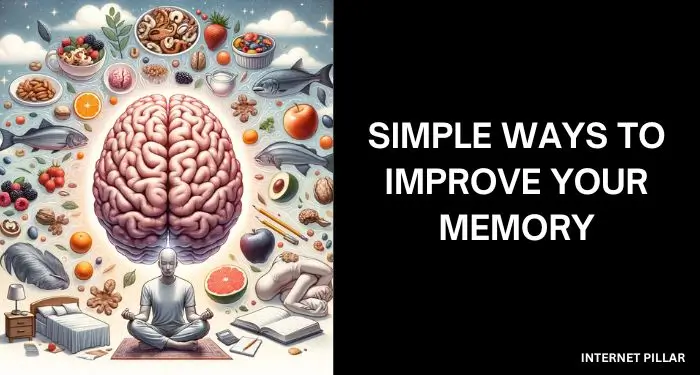Forgetting things like car keys or names is common especially during busy times.
Although memory loss can be frustrating it’s not always serious.
Factors like genetics play a role particularly in conditions like Alzheimer’s. But lifestyle and diet also significantly impact memory.
As we age memory naturally declines. This can lead to major challenges for older adults sometimes affecting their independence.
Fortunately our brain has the ability to grow and change even in old age thanks to neuroplasticity.

This means our memory isn’t fixed and can improve. To enhance memory it’s important to keep both the brain and body active.
There are many effective ways to boost memory naturally backed by scientific evidence.
15 Simple Ways to Improve Your Memory
1. Embrace New Learning Experiences
Strengthening memory is akin to building muscle strength; the key is to constantly challenge the brain.
Adopting a new skill that pushes you out of your comfort zone and demands intense focus is important.

This could include learning a musical instrument, engaging in pottery, playing strategic games like Sudoku or chess, mastering a dance form such as tango, or acquiring a new language.
These activities not only enhance memory but also broaden your skill set.
2. Daily Physical Activity
Regular physical exercise increases blood flow to the entire body, including the brain, thereby aiding in memory retention.
The Department of Health and Human Services suggests a minimum of 150 minutes of moderate aerobic activity weekly like brisk walking, or 75 minutes of vigorous activity such as jogging, for healthy adults.

Distributing this exercise throughout the week is most beneficial.
Even short 10-minute walks scattered throughout the day can be effective.
3. Reduce Added Sugar Intake
High consumption of added sugar is linked to various health issues, including cognitive decline.
Studies indicate that diets high in sugar can lead to poor memory and a reduction in brain volume especially in regions responsible for short-term memory.
For instance, a study involving over 4,000 individuals revealed that those with a higher intake of sugary drinks had lower brain volumes and weaker memories than those who consumed less sugar.
Reducing sugar intake not only bolsters memory but also contributes to overall health improvement.
4. Reduce Caloric Intake
Cutting down on calories, along with avoiding excess sugar, is beneficial for brain health.

High-calorie diets can negatively impact memory and increase the risk of obesity.
This is possibly due to the inflammation these diets cause in certain brain areas.
Animal studies primarily back this up, but a 2009 study on women around 60 years old showed that a 30% reduction in calorie intake notably improved their verbal memory.
The most improvement was seen in those who most strictly followed the diet.
5. Engage in Brain-Stimulating Activities
Keeping the brain engaged with activities like puzzles, card games, or learning new skills such as programming or dance choreography can enhance memory.
These activities are not only enjoyable but also effective in boosting brain function.
6. Practice Meditation
Meditation has several cognitive benefits, including better focus, creativity, concentration, memory, learning, and reasoning skills.
It builds connections between brain cells and can increase feelings of happiness.
7. Start Eating Brain-Boosting Foods
Certain foods are known to enhance memory due to their antioxidant and vitamin content.
Including green tea, salmon, cabbage, broccoli, cauliflower, dark chocolate, blueberries and turmeric into your diet can be beneficial.
In moderation, red wine may also improve memory, but overconsumption can have the opposite effect.
8. Staying Organized for Memory Enhancement
Organizing your space and tasks can significantly boost memory. Keep a tidy home and maintain organized notes to avoid forgetting important details.
Utilize notebooks, calendars, or digital planners for tracking tasks, appointments, and events.
Repeating information aloud while noting it down can further aid in memorization. Update your to-do lists regularly and check off completed items.
Furthermore, designating specific places for essential items like wallets and keys in your home helps in easy location.
Minimizing distractions is extremely important. Avoid multitasking and concentrate on the information you wish to remember.
Associating this information with familiar songs or sayings can also be beneficial.
9. Sleep Well
Sleep is a critical factor in memory performance.
It plays an important role in memory consolidation, where short-term memories transform into long-lasting ones.

Studies have shown that sleep deprivation negatively impacts memory.
For instance, one study involving 40 children showed that those who slept between training and testing for memory tests performed 20% better than those who didn’t sleep after training.
Another study indicated that nurses on night shifts made more mathematical errors and scored lower on memory tests than their day shift counterparts.
Adults are advised to get 7-9 hours of sleep nightly for optimal health and memory function.
10. Mnemonics, Acronyms, and Abbreviations for Memory
Mnemonics, including songs, acronyms, and abbreviations, are powerful tools for memorization.
They help by organizing and simplifying complex information. Chunking, breaking down lengthy information into smaller, manageable parts is another effective strategy.
Creating a memory palace, where you associate information with familiar places, can also aid memory.
Mnemonics have been proven since the 1960s to be an effective learning strategy.
For example, the acronym ROY G. BIV is a popular mnemonic for remembering the colors of the spectrum (Red, Orange, Yellow, Green, Blue, Indigo, Violet).
11. Eat Dark Chocolate
Dark chocolate isn’t just a treat; it’s good for memory too. A study from 2011 reveals that cocoa flavonoids in chocolate enhance brain function.
People who consume dark chocolate perform better in spatial memory tests. These flavonoids increase blood flow to the brain.
However, it’s key to choose dark chocolate with at least 72% cacao and no added sugar to avoid excess sugar intake.
12. Drink Plenty of Water
The brain is primarily composed of water which acts as a shock absorber and helps brain cells utilize nutrients.

Even mild dehydration can cause brain shrinkage and impair memory. Men should aim for about 15.5 cups and women for 11.5 cups of water daily.
Drinking eight to ten glasses per day is recommended, especially for active individuals.
13. Eating a Healthy Diet
A healthy diet benefits the brain. It should include fruits, vegetables, whole grains, low-fat proteins like fish, beans and skinless poultry.
Limiting alcohol intake is also important, as excessive consumption can cause confusion and memory loss.
Reducing sugar, fried foods and unhealthy preservatives while increasing water intake is crucial.
A healthy diet leads to more energy, exercise, and better sleep patterns, all contributing to improved memory.
14. Staying Mentally Active
Keeping the brain active is as important as physical activity for the body. Engaging in mind-stimulating activities can prevent memory loss.
This includes doing crossword puzzles, reading, playing games, learning musical instruments, starting new hobbies and volunteering.
Such activities keep the brain in shape and enhance memory.
15. Spend Time with Others
Spending time with others helps in fighting depression and stress
Socializing especially for those living alone, is important for emotional and brain health.
A 2007 study found active social lives slow memory decline with just 10 minutes of conversation boosting memory.
Social connections are key to mental well-being.
I hope these tips will help you to improve your memory.




